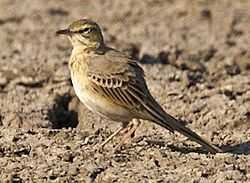Tawny Pipit
| Tawny Pipit | |
|---|---|
 | |
| Conservation status | |
| Scientific classification | |
| Kingdom: | Animalia |
| Phylum: | Chordata |
| Class: | Aves |
| Order: | Passeriformes |
| Family: | Motacillidae |
| Genus: | Anthus |
| Species: | A. campestris |
| Binomial name | |
| Anthus campestris (Linnaeus, 1758) | |
 | |
| Approximate distribution map | |

The Tawny Pipit (Anthus campestris) is a medium-large passerine bird which breeds in much of temperate Europe and Asia, and northwest Africa. It is a migrant moving in winter to tropical Africa and the Indian subcontinent.
This is a large pipit, 16 centimetres (6.3 in) long with wing-span 25–28 centimetres (9.8–11.0 in),[2] but is an undistinguished looking species on the ground, mainly sandy brown above and pale below. It is very similar to Richard's Pipit, but is slightly smaller, has shorter wings, tail and legs and a narrower dark bill. It is also less streaked. Its flight is strong and direct, and it gives a characteristic "schip" call, higher pitched than Richard's.[2]
Its song is a short repetition of a loud disyllabic chir-ree chir-ree.[2]
In south Asia, in winter some care must be taken to distinguish this from other large pipits which winter or are resident in the area, including Richard's Pipit, Blyth's Pipit and Paddyfield Pipit. Tawny Pipit is insectivorous, like its relatives.
The breeding habit is dry open country including semi-deserts. The nest is on the ground, with 4-6 eggs being laid.
In culture
The plot of the 1944 film Tawny Pipit centred on the rare event of a pair of Tawny Pipits breeding in England.[3] Eric Hosking's footage of the pipits was actually of Meadow Pipits because he could not access genuine Tawny Pipits in German-occupied Europe.[4]
References
- ↑ BirdLife International (2012). "Anthus campestris". IUCN Red List of Threatened Species. Version 2013.2. International Union for Conservation of Nature. Retrieved 26 November 2013.
- ↑ 2.0 2.1 2.2 David William Snow, Christopher Perrins (Eds) (1997). The Birds of the Western Palearctic [Abridged]. OUP. ISBN 0-19-854099-X.
- ↑ Tawny Pipit at the Internet Movie Database
- ↑ Moss, Stephen. "Brits and their birds". BBC Wildlife Magazine. Retrieved 9 December 2010.
